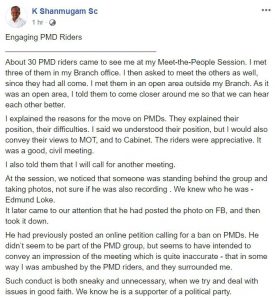Singapore— The announcement in Parliament on Monday, November 4, regarding the ban of e-scooters on footpaths probably did not come as a big surprise to many, given the rising incidence of PMD-related accidents of late, with one fatality occurring in September.
However, the ban had a great effect on one particular group of people, the food delivery riders who rely heavily on such personal mobility devices (PMDs) for their livelihood.
On the evening of Tuesday, November 5, the day the ban took effect, around 30 of such food delivery riders attended the Meet-the-People Session of Home Affairs and Law Minister K. Shanmugam.
In a Facebook post, the Minister said that at first, three of them entered his office, and then he asked to meet in an open area all of the others who had also come, in order for them to hear each other better.
Engaging PMD Riders___________________________________About 30 PMD riders came to see me at my Meet-the-People…
Posted by K Shanmugam Sc on Wednesday, 6 November 2019
On his part, Mr Shanmugam explained the Government’s side as to why the decision to ban the e-scooters on public footpaths had been made.
On the part of the food delivery riders, their position and difficulties were aired out.
The Minister told the food delivery riders that he would communicate their concerns both to the Ministry of Transport as well as the Cabinet.
Mr Shanmugam wrote, “The riders were appreciative. It was a good, civil meeting.”
He added that he said he would set another meeting with them.
Interestingly, Mr Shanmugam added in his Facebook post that a man had stood nearby while they were having their meeting. Mr Shanmugam wrote that the man was “taking photos, not sure if he was also recording.”
The man turned out to be Edmund Loke, who “had previously posted an online petition calling for a ban on PMDs”, wrote the Minister.
Mr Loke was said to have posted a photo of the meeting on Facebook, only to take it down later.
The Minister added, “He didn’t seem to be part of the PMD group, but seems to have intended to convey an impression of the meeting which is quite inaccurate – that in some way I was ambushed by the PMD riders, and they surrounded me.
Such conduct is both sneaky and unnecessary, when we try and deal with issues in good faith. We know he is a supporter of a political party.”
The Straits Times (ST) reports that the food delivery riders also appealed to Tampines GRC MP Desmond Choo for assistance in the matter.
ST quotes Mr Choo as saying, “They asked if food delivery riders could be given special licenses if they passed tests and were insured. That could be viable and should be studied further.”
MP Louis Ng from Nee Soon GRC, to whom ten residents appealed for help, said, “We are looking into providing some interim financial assistance to food delivery riders from low income families who depend on this for their livelihood.
It hasn’t been easy for them as they lost their livelihood overnight and will have to adapt now.”/ TISG
Read related: PMD users who ride on the grass beside sidewalks could be fined up to S$5,000
PMD users who ride on the grass beside sidewalks could be fined up to S$5,000













